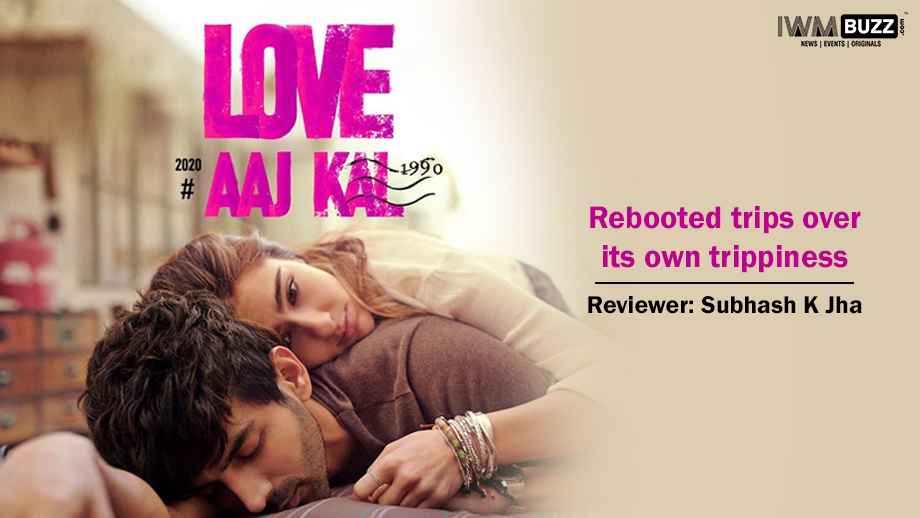The post-intermission section of Imtiaz Ali’s confounding “love” story opens with what looks a video of a cheesy rapper exhorting the persuasions of that bewildering emotion called love, the same one that Kartik Aaryan in a semi-sepia flashback is heard telling his friends feels like someone strangling him in his sleep.
That’s how we often feel while watching Imtiaz Ali’s antidotal love story. Consciously or otherwise Ali denudes the feeling of love of all romance, makes it look like a train hurtling torrentially into the land of trauma. So fasten your seatbelts, for a ride into the choppy waters of a love relationship, with Kartik Aryan playing the cross-generation, double loverboy with all the earnestness of Charlie Brown sneaking midnight treats for Snoopy.
Honestly, there is no way of telling the two Kartiks apart. Saif Ali Khan at least had the turban. As for recreating 1990, Imtiaz resorts to the most convenient and lazy tool to nostalgia: film songs. Imtiaz’s 1990 opens with Dil Deewana bin sajna ke from the film Maine Pyaar Kiya which released in 1989. There are references to Qayamat Se Qayamat Tak which came in 1988. That’s it. Raghu (Kartik playing the young version of Randeep Hooda) pursues Leena with all the sincerity of a softspoken stalker. Leena, played by semi-newcomer Arushi Sharma plays so hard-to-get you fear Raghu may stray. And he does, in most unexpected and revolting ways. Raghu’s sudden spurt of promiscuity is so absurdly out of character, and so in-character with the conduct of the characters in Imtiaz’s film. They are constantly contradicting themselves to the point of being exasperatingly incoherent. This is especially true of Sara Ali Khan who is saddled with a role that requires her to be aggressive, angry, bitter and drunk, in that order. Unable to negotiate her character’s anguish step by step she makes a horrible mess of the emotions, looking like a clueless nervous wreck in the tight close-ups that cinematographer Amit Roy insists on saddling Sara with. Not her fault. If you choose to mistake the Taj Lands End for the Taj Mahal, this is what you get.
Somehow s*x is a huge problem between Kartik’s Veer and Sara’s Zoe. He refuses to do the needful because she is, err, too good for pre-marital sex.
“I can have s*x with anyone. But I don’t want a compromised relationship with you,” Kartik whines. For some strange reason, he looks like he has just seen a ghost and speaks his lines as though just recovering from laryngitis. If this is what love does, then let’s pass.
No Valentine’s Day release could be more anti-Valentine’s than Love Aaj Kal, a purported love story spanning two eras and two couples in love who seem to hate the idea of idealizing love so much that they end up romancing the opposite of love. Or, could it be that these characters love themselves more than they love, love?
Constantly tripping over their own rites of romanticism, Imtiaz Ali’s characters contradict themselves more than even the politicians of their country. Zoe’s mother (played by an unusually over-the-top Simone Singh) chides her daughter for prioritizing love above career and later urges Zoe to marry her boss’s grandson because…well, ambitions dissolve when wealth welcomes.
Speaking of ambition, Sara’s Zoe shows up for a job interview unbuttoning her top to “impress” the interviewing committee. When she is questioned on her bizarre behaviour she smirks, “Well, I have this body. And I couldn’t leave it home when I came for this interview.”
Huh? Who is more drunk here? Zoe or the guy who wrote her lines?
For all its trippy contradictions, Love Aaj Kal is nor bereft of brilliance. Some episodes like the one where a stone-drunk Zoe is humiliated by her rough date, are ably written. The character of Zoe’s Haryanvi date is brilliantly played. The way he counts the pennies for every Tequila shot and insists that Zoe pay for the bucks with f..ks, is savagely sad and humorous.
I wish the rest of this unanchored sequel to the 2009 romcom was equally powerful. Most of the film is sadly, weak and under-written. Or worse, weak and hammy.
Like all of Imtiaz Ali’s cinema, this one too takes the protagonists on a Bharat darshan. They finally end up reunited in Himachal, with Zoe complaining that the problem of balancing career with love remains unchanged. Too tired to sigh, I simply gave up. Into this jumble of contradictory love messages, Randeep Hooda serves as a semblance of sensibleness.
A band-aid on a war wound, so to speak.


